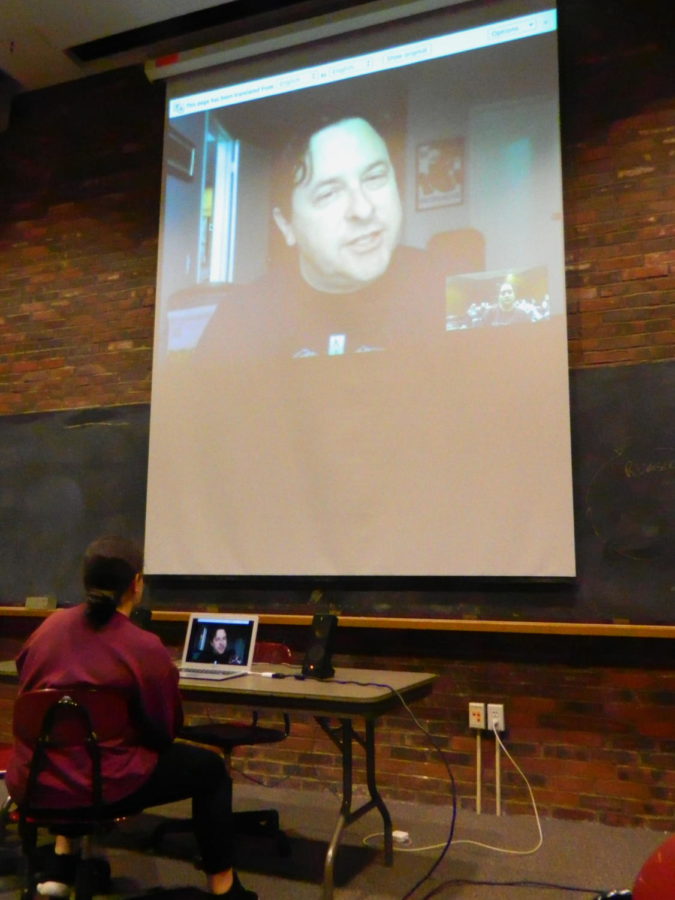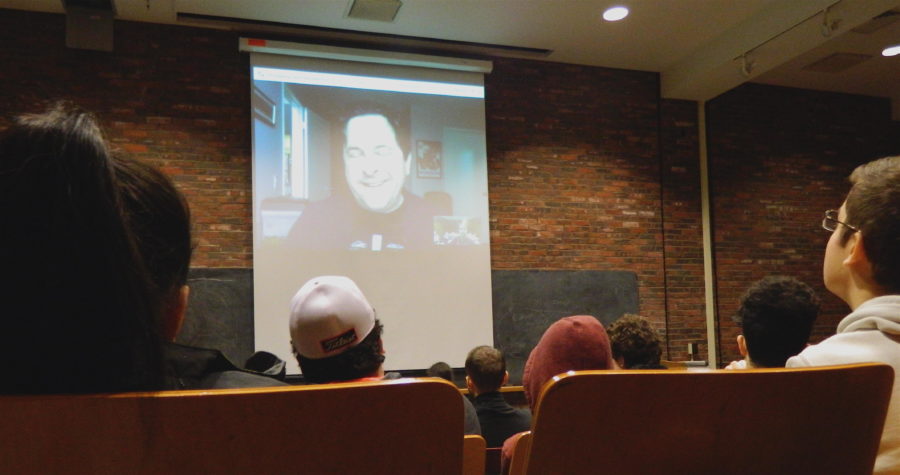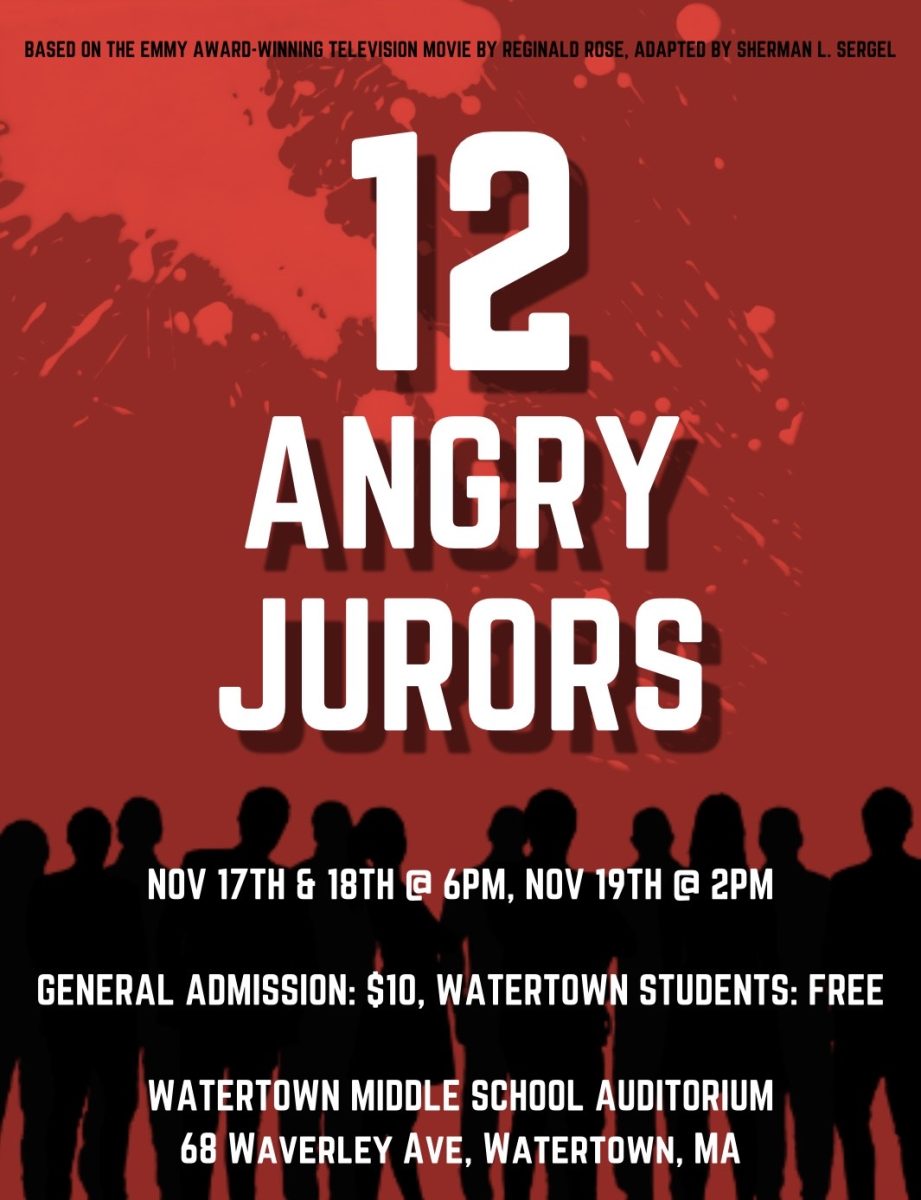Who is Chris Regan? Funny you should ask …
“Family Guy” and “The Daily Show” writer shares tips with Watertown High’s Comedy in Literature class
Comedy writer Chris Regan of “Family Guy” and “The Daily Show” chats with Jennifer Pleat’s Comedy in Literature class at Watertown High School.
April 20, 2018
The students of Watertown High were given a delightful surprise when Chris Regan agreed to be interviewed by the seniors in the Comedy in Literature class taught by Jennifer Pleat.
Chris Regan is a writer, most famously known for “The Daily Show” and, most recently, “Family Guy.” If you do not know either, well then you need to come from under that rock.
The interview was done remotely with the Watertown High students in the Lecture Hall and Chris at home in California. It kicked off with technical issues, which was a funny way to start an interview.
The WHS students were more than ready to discuss humor and comedy. We jumped right in with many creative and interesting questions, which brought up topics and situations Mr. Regan experienced throughout his life and career.
Chris informed us that his comedy path started when he was at Ithaca College and then it became a more serious thing to pursue. One of the students asked how he became interested in the field of comedy. He was quick to point that it wasn’t a passion he pursued from a young age, but rather it started in college by writing essays and joining classes that help to improve his comedy skills.
Chris told us that he watched a lot of comedy growing up because his father was a comedy guy. He added comedy is a study and an art that needs to be improved.

If writer Chris Regan were in an episode of “Family Guy,” this is how he would look.
Not playing favorites, but Chris has a few personal favorites, like Jon Stewart and Steve Carell, who Chris said were quiet off the set, but once the cameras are on is very funny.
If you are to look up “Chris Regan,” you can see that he has quite a few titles, like writer and producer. Chris was more than happy to tell us of his beginnings with “Family Guy.” He was promoted up the chain, becoming a story editor moving to executive story editor, then to co-producer, then to producer, then to a supervising producer, which he is now.
He said that with some positions, you get a bit more responsibility.
He was asked, “What do you find inspires you to write comedy?” He said, “Not sounding too cynical: Not to lose my job,” which got laugh out of the students and teachers.
Here’s how the process of “Family Guy” works:
* The first thing is the writers write a script, and the ones that are liked are selected. They do something called a table read, which is when the writers and actors act out the script for the staff and producers to see the reaction. This is also how they can tell if something has gone too far. As you continue to write, you will get a sixth sense of this, he said.
* If the script is selected, the writer creates an outline, and then a 52-page script, and that is rewritten and then approved.
* After being approved, the script is sent off to Korea where it is turned into animation, then sent back here, then screened, and rewritten, then aired on Fox.
Chris watches “Family Guy on Sunday to see what worked in the finished product. It takes about 18 months for a script before a script makes it on the air. He said you can change a few things before the show airs, but because the process takes so long, they usually stay away from current events.
He added that humor is not something that needs a lot of inspiration. You need to get to a point where you can pull out your box of tricks and make something great. Comedy requires a personal touch, your own life that needs to coincide with the work that you do. Chris pointed out that some time back, he was in a Korean soap opera; “Family Guy” re-created a moment based on his life in Season 11, Episode 11.

Comedy is also about improv and sometimes when you write something, it might not always come out the way you want, especially when an actor performs it.
Going too far is not an uncommon occurrence in comedy. With the constant need of approval, a joke can go a bit too far. ”How do you know the difference between a joke and when you have gone too far?” was the question asked.
Chris simply said it is the audience that tells you and you can get a sense of it. It also takes you having experience on stage. He said you have to first go onto a stage to figure out if your comedy clicks with an audience. Then there’s either dead silence or uncomfortable silence.
He was also asked if “you want to write a [comedy piece on a touchy subject] where do you get the most resistance? Is it usually the writers or the network that sends back a lot of [comments]?”
Chris told a story that happened before he joined “Family Guy” and an episode about abortion was written and produced all the way through. When it was just about to be shown on Fox, the network said absolutely not.
The limits placed on by a network about any subject might make something less funny, but Chris pointed out that it depends on what makes people laugh, and it is also your point of view as a writer and a producer.
He said everyone in comedy has had a bad day, but the biggest pressure is trying to shake it off and get back into the process of producing comedy.
“You need to have some sense you need to be there and deserve to be there,” he said. “[All you do is] pay your dues and put in the hours.”
Now the process to create comedy is simple: “Just keep your fingers crossed” and also have people that support you.
“You can’t write comedy in a vacuum,” he said.
–April 20, 2018–



















